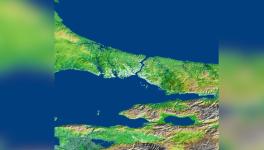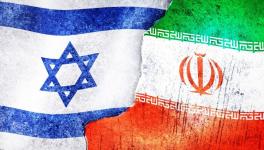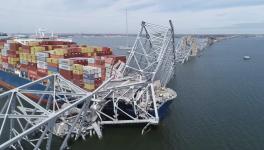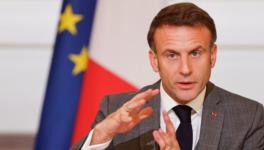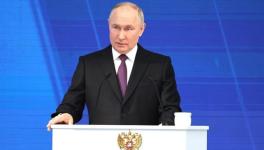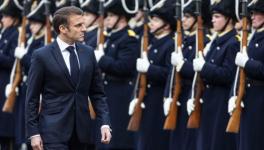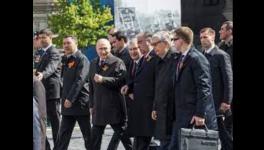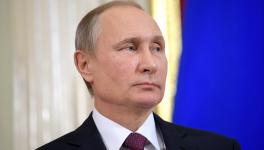Europe Sleepwalks Through its Own Dilemmas
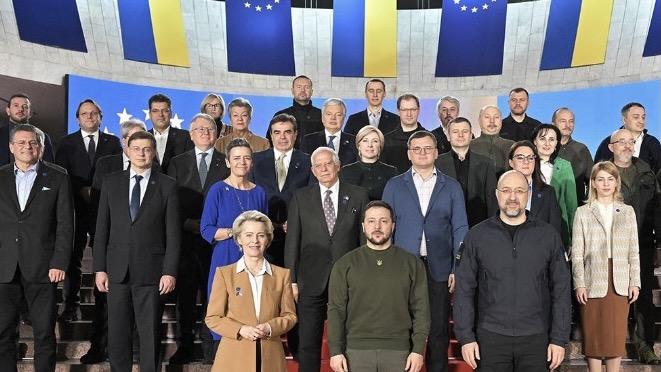
Ursula von der Leyen with Volodomyr Zelenskyy. Photo: EU Commission
On March 19, 2024, the head of France’s ground forces, General Pierre Schill, published an article in the newspaper, Le Monde, with a blunt title: “The Army Stands Ready.” Schill cut his teeth in France’s overseas adventures in the Central African Republic, Chad, Côte d’Ivoire, and Somalia. In this article, General Schill wrote that his troops are “ready” for any confrontation and that he could mobilize 60,000 of France’s 121,000 soldiers within a month for any conflict. He quoted the old Latin phrase—“if you want peace, prepare for war”—and then wrote, “The sources of crisis are multiplying and carry with them risks of spiraling or extending.” General Schill did not mention the name of any country, but it was clear that his reference was to Ukraine since his article came out just over two weeks after French President Emmanuel Macron said on February 27 that NATO troops might have to enter Ukraine.
A few hours after Macron made his indelicate statement, the US president’s national security advisor John Kirby said, “There will be no US troops on the ground in a combat role there in Ukraine.” This was direct and clear. The view from the United States is bleak, with support for Ukraine diminishing very fast. Since 2022, the US has provided over USD 75 billion in aid to Ukraine (USD 47 billion in military aid), far and away the most important assistance to the country during its war against Russia. However, in recent months, US funding—particularly military assistance—has been held up in the US Congress by right-wing Republicans who are opposed to more money being given to Ukraine (this is less a statement about geopolitics and more an assertion of a new US attitude that others, such as the Europeans, should shoulder the burden of these conflicts). While the US Senate passed a USD 60 billion appropriation for Ukraine, the US House of Representatives only allowed USD 300 million to be voted through. In Kyiv, US national security advisor Jake Sullivan implored the Ukrainian government to “believe in the United States.” “We have provided enormous support, and we will continue to do so every day and every way we know how,” he said. But this support will not necessarily be at the level it was during the first year of the war.
Europe’s freeze
On 1 February, the leaders of the European Union agreed to provide Ukraine with EUR 50 billion in “grants and highly concessional loans.” This money is to allow the Ukrainian government to “pay salaries, pensions, and provide basic public services.” It will not be directly for military support, which has begun to flounder across the board, and which has provoked new kinds of discussions in the world of European politics. In Germany, for instance, the leader of the Social Democratic Party (SDP) in the parliament—Rolf Mützenich—was taken to task by the parties of the right for his use of the word “freeze” when it comes to military support for Ukraine. Ukraine’s government was eager to procure Taurus long-range cruise missiles from Germany, but the German government hesitated to do so. This hesitation and Mützenich’s use of the word “freeze” created a political crisis within Germany.
Indeed, this German debate around further arms sales to Ukraine is mirrored in almost all the European countries that have been supplying weapons for the war against Russia. Thus far, polling data across the continent shows large majorities against the continuation of the war, and therefore against the continuation of arming Ukraine for that war. A poll conducted for the European Council on Foreign Relations conducted in February shows that “an average of just 10 [%] of Europeans across 12 countries believe that Ukraine will win.” “The prevailing view in some countries,” the poll analysts wrote, “is that Europe should mirror a US that limits its support for Ukraine by doing the same, and encourage Kyiv to do a peace deal with Moscow.” That view is beginning to enter the discussions even of the political forces that continue to want to arm Ukraine. SPD parliamentarian Lars Klingbeil and his leader Mützenich both say that negotiations will need to start, although Klingbeil said it would not happen before the US elections in November, and until then, as Mützenich had said, “I think that the most important thing now is that [Ukraine] get artillery ammunition.”
Military not climate
It no longer matters whether Donald Trump or Joe Biden wins the US presidential election in November. Either way, Trump’s views on European military spending have already prevailed in the United States. The Republicans are calling for US funding for Ukraine to be slowed down and for the Europeans to fill the gap by increasing their own military spending. This latter point will be difficult since many European states have debt ceilings; if they are to increase military spending this would be at the expense of precious social programs. NATO’s own polling data shows a lack of interest from the European population in a shift from social to military spending.
Even more of a problem for Europe is that its countries have been cutting back on climate-related investments and increasing defense-related investments. The European Investment Bank (set up in 2019) is, as the Financial Times reported, “under pressure to fund more projects in the arms industry,” while the European Sovereignty Fund—set up in 2022 to promote industrialization in Europe—is going to pivot toward support for military industries. Military spending, in other words, will overwhelm the commitments to climate investments and investments to rebuild Europe’s industrial base. In 2023, two-thirds of the total NATO budget of €1.2 trillion was from the United States, which is double what the European Union, the UK, and Norway spent on their militaries. Trump’s pressure for European countries to spend up to 2% of their GDP on their armies will set the agenda even if he loses the presidential election.
Can destroy countries, but can’t win wars
For all the European braggadocio about defeating Russia, sober assessments of the European armies show that European states simply do not have the ground military capacity to fight an aggressive war against Russia let alone defend themselves adequately. A Wall Street Journal investigation into the European military situation bore the stunning title, “Alarm grows over weakened militaries and empty arsenals in Europe.” The British military, the journalists pointed out, has only 150 tanks and “perhaps a dozen serviceable long-range artillery pieces,” while France has “fewer than 90 heavy artillery prices” and Germany’s army “has enough ammunition for two days of battle.” If they are attacked, they have few air defense systems.
Europe has relied upon the United States to do the heavy bombing and fighting since the 1950s, including in the recent wars in Afghanistan and Iraq. Due to terrifying US firepower, these Global North countries are able to flatten countries, but they have not been able to win any wars. It is this attitude that produces wariness in countries such as China and Russia, who know that despite the impossibility of a Global North military victory against them there is no reason why these countries—led by the United States—will not risk Armageddon because they have the military muscle to do so.
That attitude from the United States—mirrored in the European capitals—produces one more example of the hubris and arrogance of the Global North: a refusal to even consider peace negotiations between Ukraine and Russia. For Macron to say things like NATO might send troops into Ukraine is not only dangerous, but it strains the credibility of the Global North. NATO was defeated in Afghanistan. It is unlikely to make great gains against Russia.
Vijay Prashad is an Indian historian, editor, and journalist. He is a writing fellow and chief correspondent at Globetrotter. He is an editor of LeftWord Books and the director of Tricontinental: Institute for Social Research. The views are personal.
This article was produced by Globetrotter.
Get the latest reports & analysis with people's perspective on Protests, movements & deep analytical videos, discussions of the current affairs in your Telegram app. Subscribe to NewsClick's Telegram channel & get Real-Time updates on stories, as they get published on our website.









